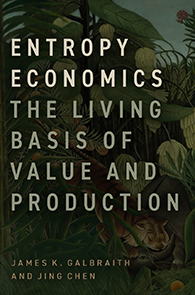A provocative new book proposes a radically different approach to economic theory
Entropy Economics: The Living Basis of Value and Production
James K. Galbraith and Jing Chen
University of Chicago Press
Chicago, IL, 2025, 248 pp., $35
Among ongoing efforts to rethink the basic tenets of mainstream economics is a provocative new book by James Galbraith and Jing Chen. The authors sweep aside the intellectual structure of mainstream theory—which rests on concepts like the marginal utility theory of value, market equilibrium, and a steady state for the economy—and propose a radically different approach: “entropy economics.”
The book is part of an emerging biophysical view of the world, grounded in the laws of nature, which sees economic activities as resembling biological and mechanical activities. For example, economies are prone to become unstable as they expand and become more complex, and they need regulation to exist and survive.
Central to the book’s thesis are the laws of thermodynamics—which state that energy can never be created or destroyed, only transformed into different forms, and that the “entropy” (roughly speaking, the degree of disorder or scarcity) in a system or process tends to increase unless it is regulated. Regulation, in this view, has the same function in economics as in mechanical and biological systems: to keep the flow of resources within a system’s capacity to handle it safely and sustainably.
Galbraith and Chen, economists at the University of Texas at Austin and the University of Northern British Columbia, respectively, argue that there is no such thing as equilibrium in real life. Instead, systems—including economies—are constantly changing under the influence of physical and biological laws in a world where resources are finite but indispensable for economic activity.
While mainstream theory emphasizes technology’s role in driving economic progress, the authors contend that technology can improve only the way natural resources are combined: Resources are the ultimate constraint on the goods and services an economy can produce. Galbraith and Chen draw out the implications of their theory for topical subjects such as growth, trade, development, finance, pensions, and climate—with often startling results.
A key premise is that advanced societies and systems are costly to set up but can run relatively smoothly if established well: They involve high fixed costs but low variable costs, in economists’ terms. A possible implication for today’s world could be that the international economic system—the result of long years of hard work (high fixed costs) to ensure that it runs smoothly (low variable costs)—would be costly to replace if it broke down. A stable, effective financial system must be under the jurisdiction of an independent regulator to ensure that each element is well managed, the authors argue.
On trade, they show that tariffs on products that involve one big producer and one big consumer can shift wealth from producing countries to consuming countries and influence the distribution of jobs across borders. They are skeptical of renewable energy because using it requires natural resources. Electric cars, for example, emit no carbon, but producing their batteries involves enormous fixed costs, such as pollution and the depletion of natural resources.
The book’s conclusions are somewhat depressing. Human survival and prosperity depend entirely on the availability of natural resources (“low entropy” energy sources). Modern industrial economies make costly and heavy use of resources, contributing to waste, a warming climate, rising seas, and falling human fertility. Given the limits on available resources, which policies and new energy sources can mitigate only up to a point, the future of human society is one of smaller populations, shorter lifespans, lower fixed costs and higher variable costs, and harsher inequalities.
For most readers, the book will be a step into the unfamiliar. The authors do not always define scientific terms, whose meaning must be inferred from the text or found elsewhere, and their intellectual framework is sometimes puzzling. Nonetheless, readers should persevere. They will be enriched by this provocative perspective.
Opinions expressed in articles and other materials are those of the authors; they do not necessarily reflect IMF policy.










